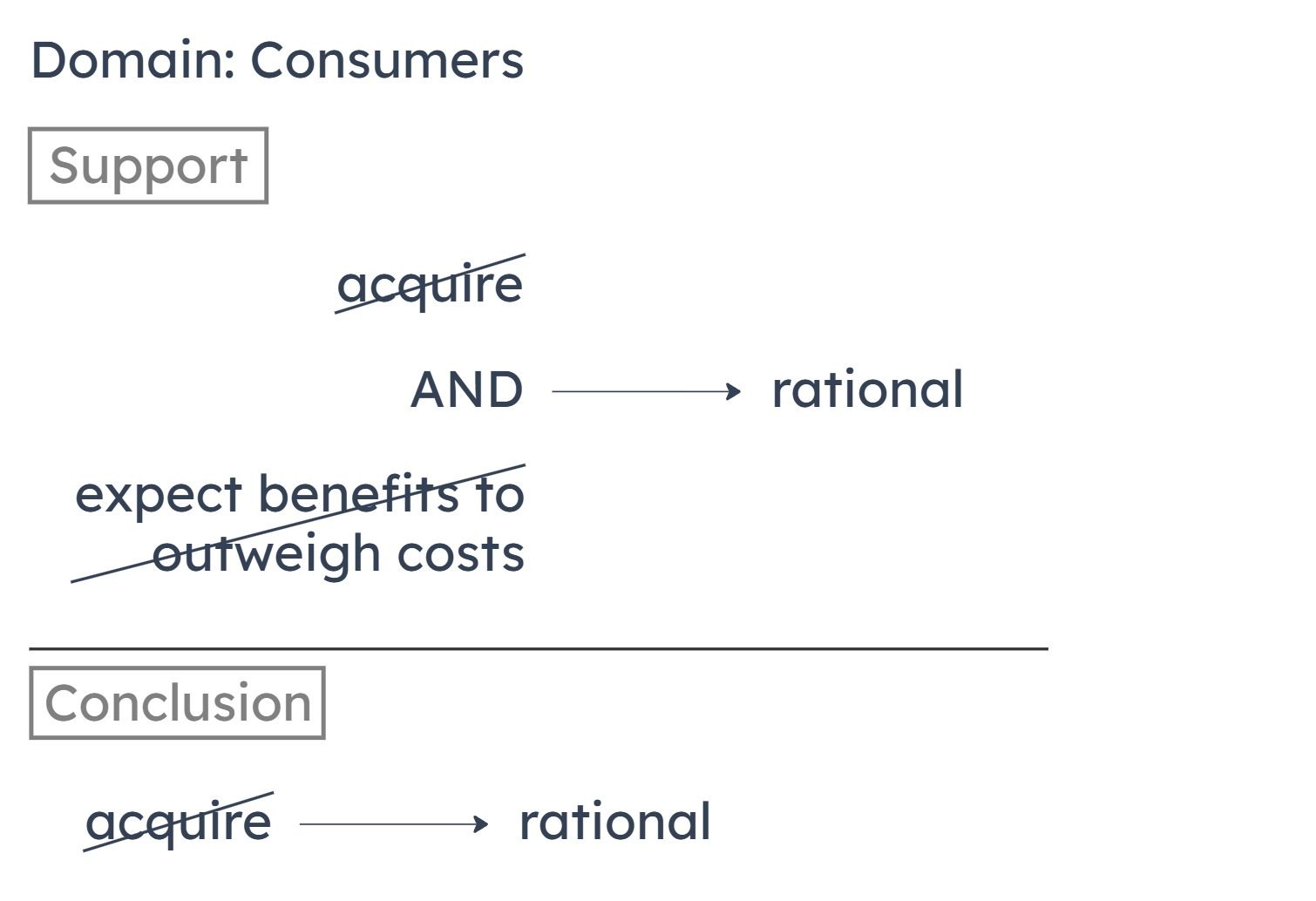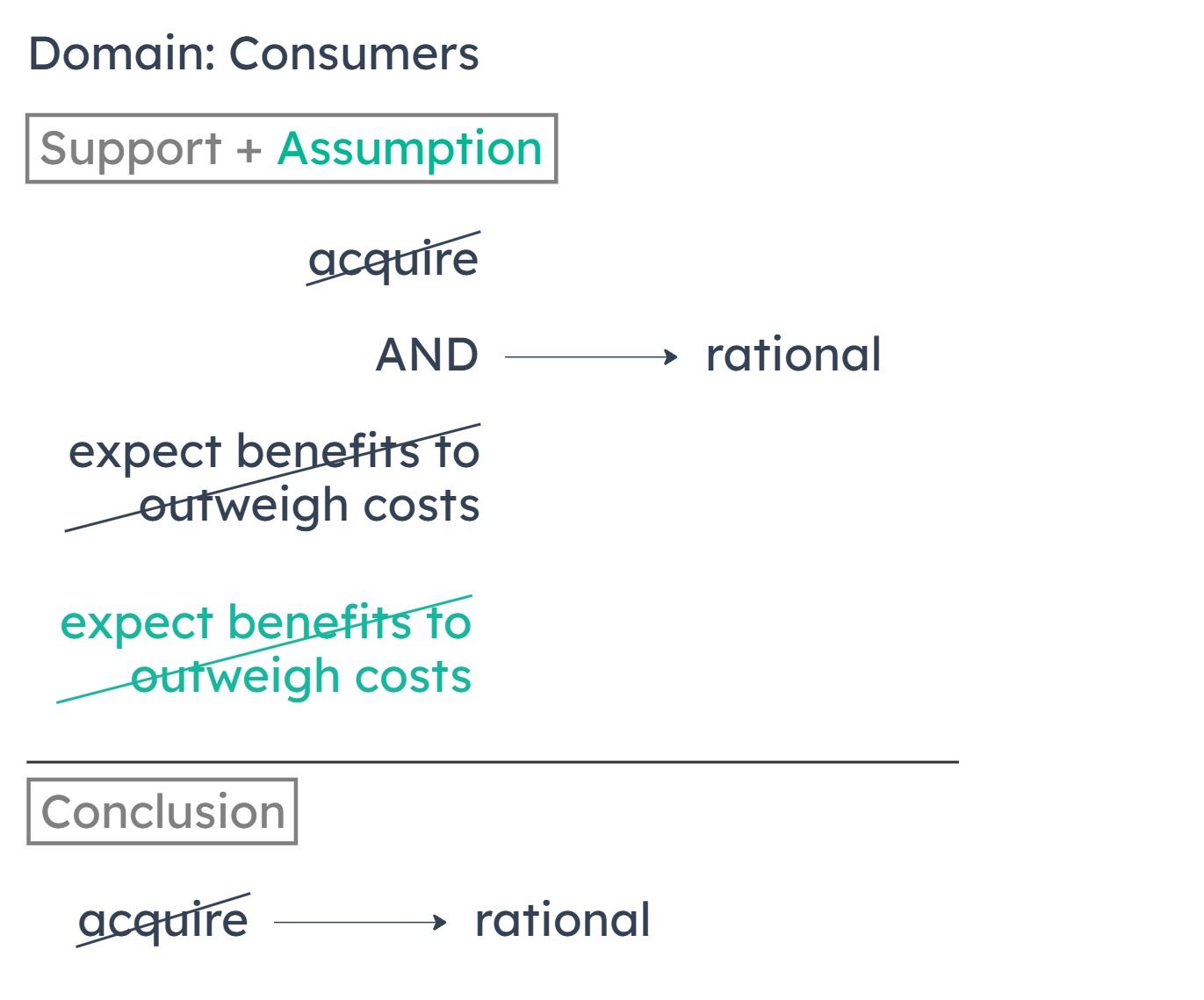LSAT 134 – Section 3 – Question 26
LSAT 134 - Section 3 - Question 26
October 2011You need a full course to see this video. Enroll now and get started in less than a minute.
Target time: 1:38
This is question data from the 7Sage LSAT Scorer. You can score your LSATs, track your results, and analyze your performance with pretty charts and vital statistics - all with a Free Account ← sign up in less than 10 seconds
| Question QuickView |
Type | Tags | Answer Choices |
Curve | Question Difficulty |
Psg/Game/S Difficulty |
Explanation |
|---|---|---|---|---|---|---|---|
| PT134 S3 Q26 |
+LR
| Sufficient assumption +SA Conditional Reasoning +CondR Link Assumption +LinkA | A
11%
161
B
8%
160
C
17%
163
D
14%
162
E
50%
168
|
156 165 175 |
+Hardest | 146.872 +SubsectionMedium |
This is based on the following premise:
If you don’t expect that the benefits of acquiring the complete info will outweigh the cost and difficulty of acquiring that info, then it’s rational not to acquire the info.

A
Rational consumers who do not expect that the benefits outweigh the cost and difficulty of acquiring detailed information about a product they might purchase usually do not bother to acquire such information.
B
Whenever it is rational not to acquire detailed information about a product, it would be irrational to bother to acquire such information.
C
The benefits of acquiring detailed information about a product one might purchase usually do not outweigh the cost and difficulty of doing so.
D
Rational consumers usually expect that the benefits of acquiring detailed information about a product they might purchase would not outweigh the cost and difficulty of doing so.
E
Consumers who do not bother to acquire complete detailed information about a product they might purchase do not expect that the benefits of acquiring such information will outweigh the cost and difficulty of doing so.

Original statement:
it is rational not to acquire such info unless one expects that the benefits of doing so will outweigh the cost and difficulty of doing so
Two ideas:
rational not acquire info
expects benefits outweigh c&d
Group 3 Rule: negate sufficient
[not] expects benefits outweigh c&d --> rational not acquire info
Contrapositive:
[not] rational not acquire info --> expects benefits outweigh c&d
Take PrepTest
Review Results
LSAT PrepTest 134 Explanations
Section 1 - Logical Reasoning
- Question 01
- Question 02
- Question 03
- Question 04
- Question 05
- Question 06
- Question 07
- Question 08
- Question 09
- Question 10
- Question 11
- Question 12
- Question 13
- Question 14
- Question 15
- Question 16
- Question 17
- Question 18
- Question 19
- Question 20
- Question 21
- Question 22
- Question 23
- Question 24
- Question 25
Section 2 - Logical Reasoning
- Question 01
- Question 02
- Question 03
- Question 04
- Question 05
- Question 06
- Question 07
- Question 08
- Question 09
- Question 10
- Question 11
- Question 12
- Question 13
- Question 14
- Question 15
- Question 16
- Question 17
- Question 18
- Question 19
- Question 20
- Question 21
- Question 22
- Question 23
- Question 24
- Question 25
Section 3 - Logical Reasoning
- Question 01
- Question 02
- Question 03
- Question 04
- Question 05
- Question 06
- Question 07
- Question 08
- Question 09
- Question 10
- Question 11
- Question 12
- Question 13
- Question 14
- Question 15
- Question 16
- Question 17
- Question 18
- Question 19
- Question 20
- Question 21
- Question 22
- Question 23
- Question 24
- Question 25
- Question 26
Leave a Reply
You must be logged in to post a comment. You can get a free account here.